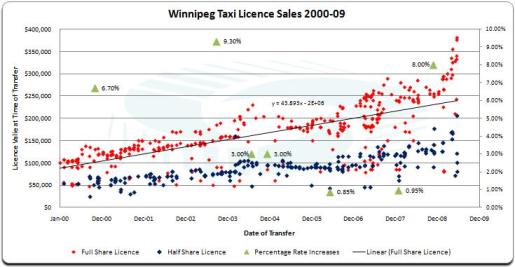According to analysis by two University of Manitoba professors, increases in cab rates by the Manitoba Taxicab Board have allowed Winnipeg taxi drivers to earn more than the "modest profit" that the Board should target when setting taxi rates. Instead, excessive increases have allowed license holders to capitalize considerable value into the resale value of their licences.
In theory, the Board should be ensuring a balance between the competing desires of the public (who want low fares) and the industry (who want higher revenues). If they were to achieve this balance, the last potential driver should be ambivalent about entering the industry, being a taxi driver should be no more or less attractive than his or her other opportunities. In this case, we would not expect a potential driver to pay any fee beyond normal start-up costs to enter the taxi industry.
However the current value of taxi licenses suggests that being a taxi driver is much better than the next best option of many would-be drivers. When revenues are higher than operating costs, there is a high demand to enter the industry. With a limited supply of licences (Winnipeg has had approximately 410 available since the 1940’s), access to them has to be rationed somehow.
The price of a license appears to be creating the equilibrium between would be drivers and the industry. Over the past decade, this price has risen from around $100,000 to over $300,000. This price represents the capitalization of surplus profits allowed under the current regulatory regime. Professors Prentice and Mossman from the University of Manitoba have used regression analysis to find that a further $0.30 increase in the "drop charge" as is currently being considered by the taxi-cab board can be expected to inflate license values by a further $24,620.
Plotting a line-of-best-fit across the resale values of full shares in Winnipeg Taxi licenses shows that the value of a license has increased by a trend average of $43.89 per day for the past 10 ½ years. As Mossman and Prentice point out, this was equivalent to 14.87per cent per annum over a period where inflation was rarely over two per cent.
This rigorous work of Professors Mossman and Prentice illustrates several themes regarding taxi regulation:
- While there may well be "market failures" in the taxi industry, there are also clearly "regulatory failures" when the price of a piece of paper required to drive a taxi is worth $350,000.
- Taxi regulators face real problems with identifying the true costs of operating cabs, deciding what a "reasonable profit" is, and arbitrating the conflicting interests of drivers, license holders, and the public.
- Capitalisation of taxi revenues into license values has created major barriers to entry for would be-taxi drivers, and at the same time created large vested interests for licence holders who need the regulator to refrain from releasing more licences but continue to increase fare rates if they are to retain their licence values.
As the Frontier Centre has previously recommended, Canadian cities would be best to follow the Irish and New Zealand models, getting out of regulating the number of taxis or the prices they can charge, and focusing only on the quality and safety of cabs.
Data Source: Prentice, B and Mossman, C; University of Manitoba.



